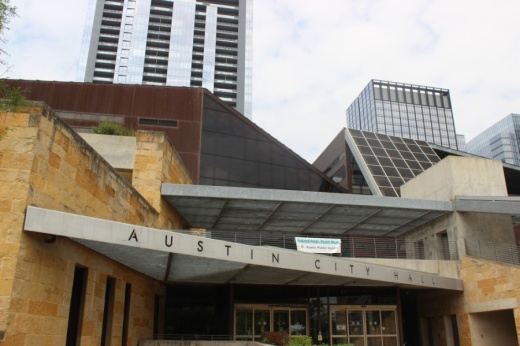Designated campsites, temporary housing for the homeless
After Austinites' May 1 vote for the passage of Proposition B, criminal penalties for camping, lying down and panhandling in public will be reinstated beginning May 11. In the wake of the election, city officials are considering how to begin outreach and subsequent enforcement of the measures aimed at the city's unsheltered homeless population, and council on May 6 will also consider a possible shift in strategy for addressing unregulated homeless encampments that will soon be criminalized.
A late add to Thursday's agenda written and sponsored by Council Member Kathie Tovo, and cosponsored by several others on the dais, the item could set the city on a path toward establishing designated encampments for the homeless and the expansion of tiny home infrastructure in the city to serve as temporary housing. If approved, the resolution would prompt City Manager Spencer Cronk to report back to council over the coming weeks with outlines for the potential implementation of such city-managed temporary housing sites.
In a council message board post on the agenda item, Tovo noted that council's previous exploration of the designated campsite concept in 2019 ended with Cronk declining to take further action on identifying possible camp locations. Since that point, however, "our reality—and our resources—have changed," Tovo said.
"We have a lot to learn about whether this will be a good strategy for Austin and, if so, how we can do it well," Tovo wrote. "Temporary, designated camping spaces are one way we can help mitigate the persistent safety risks for our unsheltered neighbors. This solution is not perfect—the ideal solution is more low-barrier and permanent supportive housing. Until that can be achieved—an effort I will continue to promote at every opportunity—I believe we must examine the viability of offering safer places to live temporarily until permanent housing is available."
The resolution was added to council's agenda May 3 with cosponsorships from Mayor Steve Adler and council members Ann Kitchen, Alison Alter and Pio Renteria. Also via the message board, Kitchen voiced support for finding new regulated campsite options—provided they remain short-term fixes while the city moves forward on longer-term housing solutions.
"It is time that we have this conversation again and determine options for temporary, safer camping locations, while we work to connect people to housing and services. These locations must be carefully considered and aligned with public space needs," Kitchen wrote. "With that said, I want to emphasize temporary. As you point out [council member] Tovo, we must remain focused on and accelerate our work connecting people with housing and services."
A new start for APD cadet training
Council could also vote May 6 to restart the training of new APD recruits with the commencement of the department's 144th cadet class tentatively scheduled for early June, if approved.
Council heard updates from Interim Police Chief Joseph Chacon and representatives with Kroll Associates, the outside consulting firm tasked with reviewing and monitoring the "reimagining" of the APD cadet training academy, during a May 4 work session presentation on the recommended progress markers APD is expected to clear before proceeding with a new cadet class.
Officials seemed generally supportive of a range of structure and curriculum updates implemented at the academies through its overhaul over recent months, with some questioning the ongoing reviews of APD's commitment to changes and inclusion of community recommendations regarding cadet training. Item 10 would formalize the commencement of the new cadet class via council resolution, and Item 38 would authorize an additional $375,000 for Kroll's ongoing assessment of the academy.
Directing federal pandemic aid
Item 2 on the agenda would see council accept nearly $100 million in federal coronavirus relief funds provided through the American Rescue Plan.
While council will only take action on accepting the funding May 6 with final decisions on remaining allocations to come later this spring, officials spent some time May 4 discussing where the remainder of the funding could be directed. Council members suggested the millions of additional relief dollars could be used for purposes such as city homelessness initiatives, eviction support, public health or addressing the expected budget deficits.
Cronk said more specific recommendations on the funding could be presented at a May council work session, with action items firming up funding plans to be considered in early June.
Equitable transit planning
Sponsored by Council Member Natasha Harper-Madison and cosponsored by Adler and council members Greg Casar, Vanessa Fuentes and Paige Ellis, another resolution up for consideration May 6 would direct Cronk to participate in ongoing Capital Metro equity planning and construct a new equity plan for Austin ahead of upcoming Project Connect bus and rail expansions in the city.
Harper-Madison on May 4 said she wants to both ensure that Austinites relying on the city's current transit system will not be pushed out as Project Connect infrastructure comes online, and expand on the city's equitable transit-oriented development, or eTOD, policy planning for residents, businesses and developments in areas adjacent to future transit paths.
"The end goal is to have a policy plan in place that serves as a guide to make necessary changes to avoid potential displacement, maintain affordability and provide for more opportunities for more people of all income levels to live and work near this transit investment," Harper-Madison said May 4. "This resolution is about coordinating with [Capital] Metro to set up the city for success, to be able to implement the necessary changes to support Project Connect as soon as we can get the green light."
Kitchen also proposed several amendments to Harper-Madison's original resolution earlier this week she said were aimed at clarifying the scope and timeline for transit-oriented development planning, with the final language of the policy planning resolution to be discussed May 6 ahead of its possible passage.





